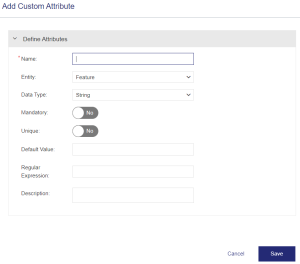Custom Attributes
|
>Custom Attribute Support for Entities |
New to Sentinel EMS?
|
What is a Custom Attribute?
Custom attributes let you create placeholders to store additional information for an entity. This information can be input by the user while creating or editing that entity.
For example, your users may need to save the company web site address for each contact they create. For this, you can create a custom attribute, Company Website, for the contact entity. Whenever a contact is created, the user can save the company web site address for that contact in this custom attribute.
Custom Attribute Support for Entities
The following table lists the entities that support custom attributes along with their supported data types:
| Entity | Supported Data Types | |||||
|---|---|---|---|---|---|---|
| String | Date | Numeric | Boolean | List | XML | |
| Feature |
|
|
|
|
|
|
| Product |
|
|
|
|
|
|
|
|
|
|
|
|
|
|
| Customer |
|
|
|
|
|
|
| Contact |
|
|
|
|
|
|
| Entitlement |
|
|
|
|
|
|
| Channel Partner |
|
|
|
|
|
|
| Activation |
|
|
|
|
|
|
| Product Key (Line item) |
|
|
|
|
|
|
| Channel Partner Users |
|
|
|
|
|
|
| Download |
|
|
|
|
|
|
Prerequisites for Creating a Custom Attribute
The user must have administrative rights in Sentinel EMS.
Creating a Custom Attribute
From the navigation pane, select Configuration > Custom Attributes to view the Custom Attributes page. The Add Custom Attribute button on this page is used to create a custom attribute using the page given below:
Defining Custom Attributes
The following table explains the attributes that are used to create a custom attribute:
| Attribute | Description | Required/Optional | Valid Values |
|---|---|---|---|
| Name | Name of the custom attribute. | Required |
>Must be unique for a given entity. >Alphanumeric |
| Entity |
The entity for which the custom attribute is being created. |
>Feature >Product > Product Suite* > Customer > Contact > Entitlement >Channel Partner > Activation >Product Key >Channel Partner Users >Download |
|
| Data Type | Data type of the custom attribute |
> String > Date >Numeric >Boolean > List >XML See Custom Attribute Support for Entities for more information on data-type support based on entities. |
|
| Mandatory | The optional or mandatory status of the custom attribute. |
"Yes" or "No" Default: "No" |
|
| Unique |
Make the value of a custom attribute unique and mandatory. Default Value is disabled when Unique is set to "Yes". |
"Yes" or "No" Default: "No" For activation entitles, set to "No". |
|
| Default Value | Default value of the custom attribute. Displayed only if Unique is set to "No". | Optional | Must meet the validity of the data type. |
| Regular Expression |
Defines the restrictions for the input value of the custom attribute. Example: [-a-z0-9]+(\.[-a-z0-9]+)* |
Optional | Must be a valid regular expression. |
| Description | Additional information about the custom attribute. | Optional |
>Alphanumeric >0 to 500 characters |
Where are Custom Attributes Available for an Entity?
After you create a custom attribute, it is available on the create or edit page of its entity. Custom attributes that are optional appear in the Additional Attribute section and are sorted by their creation date and time. Mandatory custom attributes are listed under primary entity attributes.
Actions for a Custom Attribute
The following table lists the actions available for custom attributes:
| Action | Description | ||
|---|---|---|---|
|
Updates information for an existing custom attribute. Note: >When editing a custom attribute that contains duplicate values, you cannot set the Unique attribute to "Yes". >You cannot specify a Default Value if Unique is set to "Yes". |
||
|
Deletes a custom attribute. Note: >You can delete a custom attribute only if it is not used in any entity. |

